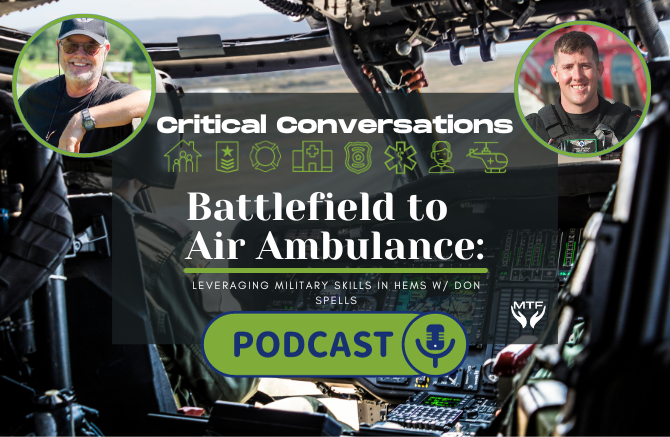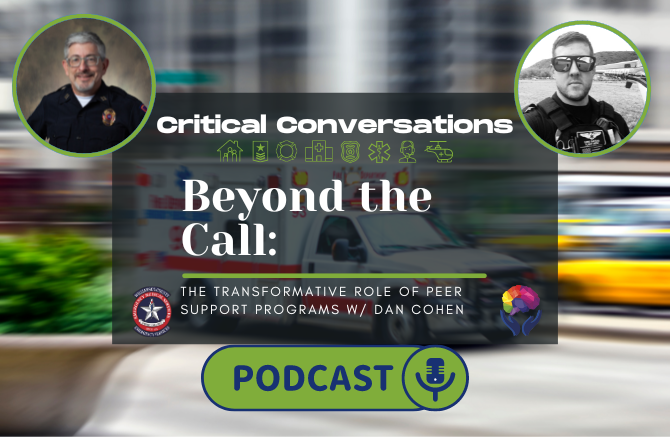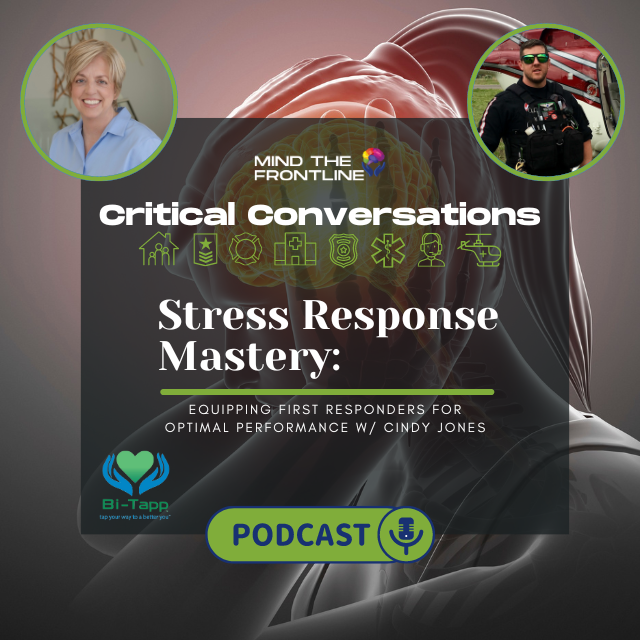Beyond the Call: The Transformative Role of Peer Support Programs w/ Dan Cohen
THE TRANSFORMATIVE ROLE OF PEER SUPPORT PROGRAMS Welcome to Critical Conversations by Mind the Frontline, where we unravel the profound impact of...
6 min read
 Chris Smetana, AS, FP-C, CCP-C, NRP | Founder/President
:
Apr 23, 2024
Chris Smetana, AS, FP-C, CCP-C, NRP | Founder/President
:
Apr 23, 2024

Explore the unique challenges and benefits of military veterans transitioning into the Emergency Medical Services field, with a focus on mental health and long-term resilience.
Transitioning from a military background to the Emergency Medical Services (EMS) field can be a complex process, requiring individuals to navigate dual identities. Military veterans bring valuable skills and experiences to the EMS field, but they must also adjust to a new professional identity and culture. Don Spells is one example of someone who has successfully managed this transition.
One challenge that military veterans face when transitioning to EMS is reconciling their military identity with their new role as a first responder. In the military, individuals are often part of a larger unit and have a clear chain of command. In EMS, however, they must adapt to a more independent and collaborative work environment. This shift in identity can be difficult, but it also presents an opportunity for personal growth and development.
Another challenge is adjusting to the differences in structure and precision between the military and EMS. The military is known for its strict adherence to rules and procedures, while EMS requires flexibility and adaptability in fast-paced, dynamic situations. Military veterans must learn to embrace this unpredictability and develop strategies for navigating high-stress situations.
Despite these challenges, there are also many benefits to transitioning from a military background to EMS. Military veterans often bring strong leadership skills, discipline, and a sense of duty to their role as first responders. They are accustomed to working in high-pressure environments and are trained to remain calm and focused in stressful situations. These qualities make them well-suited for the fast-paced nature of EMS work.
In terms of mental health, managing dual identities can have both positive and negative impacts. On one hand, the sense of purpose and camaraderie that veterans experience in the military can contribute to their overall well-being and resilience. On the other hand, the transition to a new professional identity and culture can be challenging and may lead to feelings of isolation or loss of identity. It is important for veterans transitioning to EMS to prioritize self-care and seek support from their peers and community resources.

The contrast in culture between the military and EMS can be significant, requiring military veterans to make mental adjustments and develop strategies for adapting successfully. The military is known for its precision, structure, and strict adherence to rules and procedures. In EMS, however, flexibility and adaptability are essential due to the dynamic and fast-paced nature of the work.
To successfully transition from military precision to EMS flexibility, veterans must recognize and embrace the differences in culture. This may involve letting go of the need for strict hierarchy and following orders without question, and instead cultivating a collaborative and independent mindset. It also requires developing the ability to think quickly on their feet and make decisions in high-pressure situations.
One strategy for adapting to the cultural shifts is to seek out mentorship and guidance from experienced EMS professionals. Learning from those who have successfully made the transition can provide valuable insights and support. Additionally, participating in peer support groups or connecting with other military veterans who have transitioned to EMS can help create a sense of belonging and camaraderie.
It is important for military veterans transitioning to EMS to approach the cultural shifts with an open mind and a willingness to learn and grow. By recognizing the unique strengths they bring from their military background and embracing the flexibility and adaptability required in EMS, they can thrive in their new profession.
-Apr-23-2024-05-21-38-0657-PM.png?width=307&height=200&name=Blog%20Pictures%20(1)-Apr-23-2024-05-21-38-0657-PM.png)
For military veterans like Don Spells who have extensive experience in Helicopter EMS (HEMS), mental preparedness is crucial due to the unpredictable nature of air medical services. HEMS involves responding to emergencies in challenging environments, often under extreme time pressure.
To cope with the high-stress situations in HEMS, it is important for veterans to develop strategies for maintaining mental well-being. This may include practicing mindfulness techniques, engaging in regular exercise, and seeking professional counseling or therapy if needed. It is also important to establish a strong support network of colleagues, mentors, and loved ones who can provide emotional support and understanding.
In addition to these individual strategies, organizations that employ HEMS professionals should prioritize mental health and provide resources and support for their employees. This can include offering mental health services, implementing stress management programs, and promoting a culture of open communication and support.
Overall, embracing the unpredictable nature of HEMS requires a combination of mental preparedness, self-care, and a supportive environment. By prioritizing mental health and well-being, veterans can continue to thrive in their HEMS careers.
-Apr-23-2024-05-21-38-0093-PM.png?width=307&height=200&name=Blog%20Pictures%20(2)-Apr-23-2024-05-21-38-0093-PM.png)
Establishing a supportive community is crucial for military veterans transitioning into EMS. This community can provide mentorship, peer support, and access to valuable resources that facilitate a positive transition experience.
Mentorship is one key element of a supportive transition community. Having a mentor who has successfully navigated the transition from military to EMS can provide guidance, advice, and reassurance. Mentors can share their own experiences, help veterans identify transferable skills, and offer support during challenging times.
In addition to mentorship, peer support is essential for creating a sense of belonging and camaraderie. Connecting with other military veterans who have transitioned to EMS can provide a support network of individuals who understand the unique challenges and experiences of this transition. Peer support groups, either in person or online, can offer a safe space for veterans to share their thoughts, concerns, and successes.
Community resources, such as veteran-focused organizations or programs, can also play a vital role in supporting the transition. These resources may offer specialized training, educational opportunities, or financial assistance. By tapping into these resources, veterans can access the support they need to thrive in their new EMS careers.
Building a supportive transition community requires active engagement and willingness to seek support. By leveraging mentorship, peer support, and community resources, military veterans transitioning into EMS can enhance their transition experience and set themselves up for success.
-Apr-23-2024-05-21-37-8992-PM.png?width=307&height=200&name=Blog%20Pictures%20(3)-Apr-23-2024-05-21-37-8992-PM.png)
Military veterans bring a range of transferable skills and experiences to the EMS field, which can greatly enhance their effectiveness as first responders and contribute to their mental well-being.
One of the key transferable skills is leadership. In the military, veterans are trained to lead and make decisions under pressure. This ability to lead and take charge can be invaluable in EMS, where quick thinking and decisive action are often required.
Discipline and a strong work ethic are also transferable skills that veterans bring to EMS. The military instills a sense of duty and responsibility, which translates well to the demanding nature of EMS work. Veterans are accustomed to working long hours, staying focused in high-stress situations, and going above and beyond to fulfill their responsibilities.
Additionally, veterans often have experience working in diverse and multicultural environments, which can be particularly valuable in EMS. They are trained to respect and appreciate different cultures and backgrounds, allowing them to provide culturally competent care to a diverse range of patients.
By recognizing and leveraging these transferable skills, veterans can excel in their role as first responders and find fulfillment in their EMS careers. It is important for organizations to recognize and value the unique strengths that military veterans bring, and to provide support and resources that help them thrive in their new profession.
-3.png?width=307&height=200&name=Blog%20Pictures%20(4)-3.png)

With a remarkable 45 years of experience in helicopters, totaling over 10,000 hours in both helicopter and fixed-wing aircraft, 37 years in EMS, and a distinguished 40+ years of service in the Army, Reserves, and National Guard, Don Spells brings a wealth of expertise to the field.
Explore many valuable First Responder Mental Health and Wellness resources on Mind the Frontline's online platform. Discover the link below to access a wide range of support and information tailored specifically for first responders.
Additional Mind the Frontline Resource's
Stay connected with Mind the Frontline on Facebook & LinkedIn.
$50 off code:frontline40
Invest in your mental health with the Mind Shield Health and Wellness Membership—a transformative resource tailored for first responders. For less than $4 per month, this 100% tax-deductible membership offers a suite of exclusive benefits designed to enhance your overall well-being.
Membership Highlights:
The Largest Online First Responder Mental Health and Wellness Resource Directory: Immediate access to a comprehensive database catering to the unique needs of first responders.
State-by-State Mental Health, Wellness, and Recovery Resources: Navigate a localized guide for personalized support.
MindShield 24/7 Debrief Hotline: Confidential and secure debriefing space, available whenever you need it.
Virtual 1-1 Peer Support: Connect with a supportive network of peers through our virtual platform.
Mind the Frontline's Preferred Mental Health Providers List: Access trusted mental health professionals aligned with our mission.
Discounts to Mental Health Apps: Exclusive discounts on leading mental health apps like Headspace and more.
Recommended Books, Podcasts, and Resources: Curated selection to enhance your mental health journey.
Weekly Blog Articles/Podcasts: Stay informed and inspired with regular content delving into crucial insights and topics.
Interactive Workshops and Webinars: Engage in dynamic sessions promoting mental health, career development, and overall well-being.
Mindfulness and Meditation Resources: Tools for incorporating mindfulness into your daily routine.

THE TRANSFORMATIVE ROLE OF PEER SUPPORT PROGRAMS Welcome to Critical Conversations by Mind the Frontline, where we unravel the profound impact of...

Explore the power of a growth mindset in promoting resilience and overcoming challenges.

Mastering Stress Responses: Empowering First Responders for Peak Performance